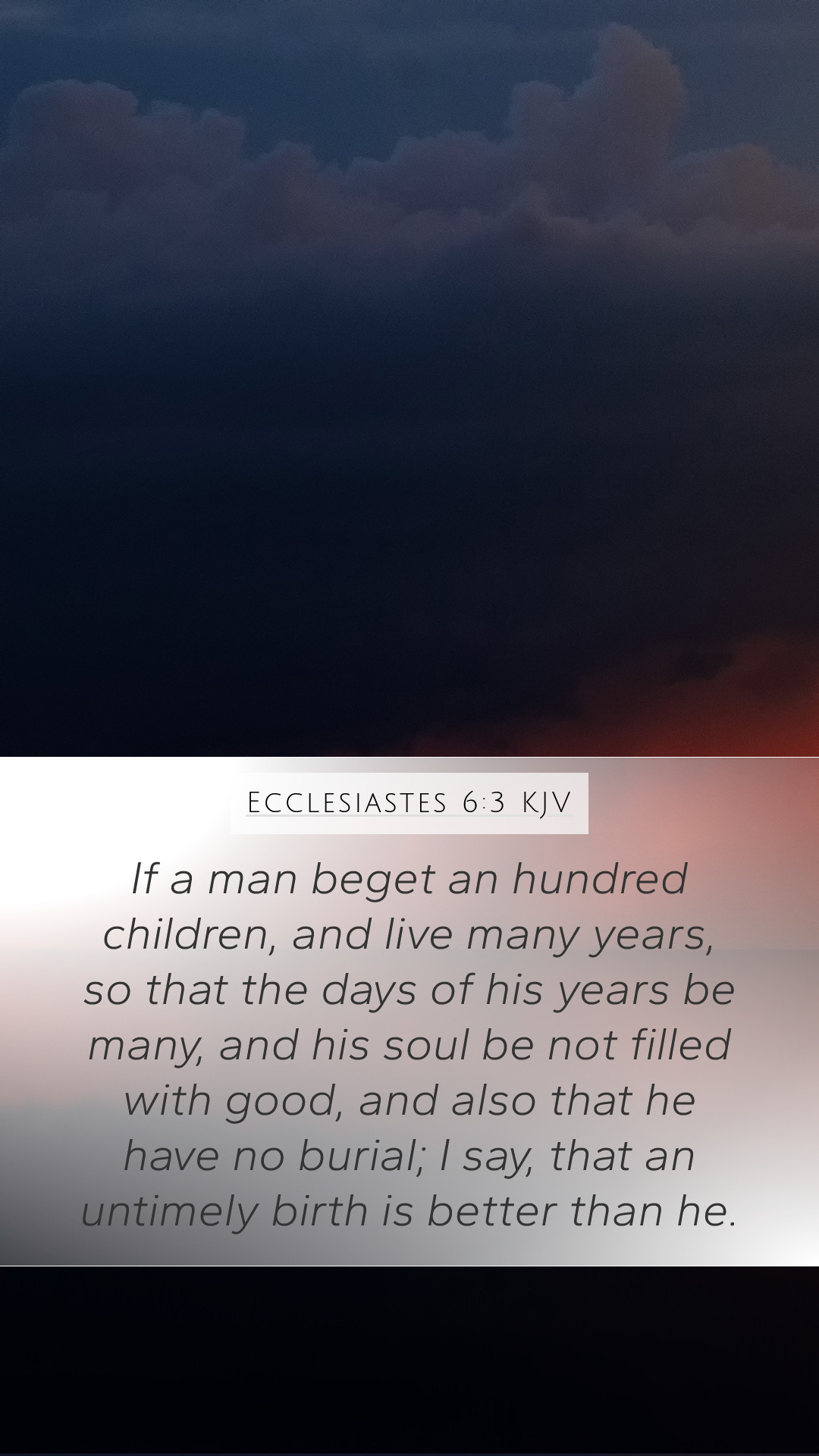Old Testament
Genesis Exodus Leviticus Numbers Deuteronomy Joshua Judges Ruth 1 Samuel 2 Samuel 1 Kings 2 Kings 1 Chronicles 2 Chronicles Ezra Nehemiah Esther Job Psalms Proverbs Ecclesiastes Song of Solomon Isaiah Jeremiah Lamentations Ezekiel Daniel Hosea Joel Amos Obadiah Jonah Micah Nahum Habakkuk Zephaniah Haggai Zechariah MalachiEcclesiastes 6:3 Meaning
What is the meaning of Ecclesiastes 6:3?
If a man beget an hundred children, and live many years, so that the days of his years be many, and his soul be not filled with good, and also that he have no burial; I say, that an untimely birth is better than he.
Ecclesiastes 6:3 Bible Verse Meaning
Understanding Ecclesiastes 6:3 - Bible Verse Commentary
Ecclesiastes 6:3 states: "If a man beget a hundred children, and live many years, so that the days of his years be many, and his soul be not filled with good, and also that he have no burial; I say, that an untimely birth is better than he."
This verse presents a profound reflection on the nature of existence and the value of life itself. The author of Ecclesiastes, often believed to be King Solomon, addresses the aspects of life that bring true fulfillment and the tragedy of unfulfilled life. Here we summarize and draw insights from public domain commentaries, aiming for a comprehensive bible verse explanation.
Overview of the Verse
In this verse, the author compares a man who has many children and lives a long life, yet lacks fulfillment, to a child who dies prematurely. The stark contrast highlights a critical evaluation of what it means to live a good life versus merely existing.
Commentary Insights
- Matthew Henry’s Commentary: Henry remarks on the futility of outward success, such as having many offspring or a long life, if inner satisfaction and fulfillment are absent. He emphasizes that true happiness does not come merely from external achievements but from the quality of life lived.
- Albert Barnes’ Notes: Barnes interprets this verse as a commentary on the solitary and unfulfilled life. He notes that a person may achieve worldly success but if their desires are not satisfied and they lack a meaningful legacy, their life is rendered less significant.
- Adam Clarke’s Commentary: Clarke discusses the cultural implications related to lineage and legacy in ancient times. He notes that bearing children is often seen as a blessing, but if one's life is devoid of good, the 'untimely birth' signifies that sometimes, never being fully brought into life is better than living without purpose.
The Nature of Fulfillment
Understanding what constitutes a fulfilling life is a key theme in this verse. The lack of satisfaction is emphasized as a tragic reality for those who might otherwise seem prosperous. The verse challenges readers to think deeply about what it means to lead a good life, involving spiritual fulfillment rather than material or familial accomplishments alone.
Cross References
This verse relates to several other biblical passages that discuss themes of fulfillment and the quality of life:
- Proverbs 14:12: "There is a way that seems right to a man, but its end is the way to death." This echoes the themes of misguided pursuits leading to poor outcomes.
- Psalm 127:3: "Children are a heritage from the LORD, the fruit of the womb a reward," which highlights the positive view of children contrasted with the author's lament in Ecclesiastes.
- 1 Timothy 6:7: "For we brought nothing into the world, and we cannot take anything out of the world," reinforcing the idea that material gain is ultimately meaningless.
Application of the Verse
In studying this verse, one can reflect on its application in daily life. One must consider their own pursuits and the motivations behind them. Are they focused on transient achievements, or are they striving for a life filled with meaning and purpose?
This discussion can serve as a basis for bible study groups or online Bible study sessions where individuals explore similar themes of fulfillment, the value of relationships, and the essence of true happiness in a biblical context.
Conclusion
Ecclesiastes 6:3 serves as a poignant reminder of the deeper aspects of life that transcend mere existence. As readers and practitioners of faith, it's critical to balance our worldly pursuits with introspective spirituality that leads to fulfillment and a legacy worth leaving.
Embrace the insights from public domain commentaries when diving into this or any scripture, exploring the meaning of Bible verses and enriching your Biblical exegesis to apply God’s word in meaningful ways.


